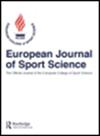运动强度调节运动过程中热应激对底物氧化速率的影响
IF 3
3区 医学
Q2 SPORT SCIENCES
引用次数: 9
摘要
高温刺激运动过程中内源性碳水化合物代谢;然而,目前尚不清楚运动强度是否会影响热应激的代谢效应。在这个两部分调查的第一项研究中,耐力训练的男性自行车手在18°C和35°C (60% rH)下进行增量运动评估。热应激对碳水化合物氧化速率的刺激作用在高、中、低相对强度下更大(P < 0.05)。与此一致的是,在随后的60分钟低强度循环中,没有观察到热应激对碳水化合物氧化率的影响。在研究二中,耐力训练的男性骑行者在18、28、34和40°C (60% rH)条件下进行20分钟的中等强度(第一次通气阈值)和5分钟的高强度(第二次通气阈值)骑行。在中等强度条件下,40°C热应激显著提高了碳水化合物氧化速率(P < 0.05),而在高强度条件下,34°C和40°C热应激显著提高了碳水化合物氧化速率(P < 0.05)。这种运动强度介导的热应激对碳水化合物氧化影响的调节可能部分归因于观察到的血浆肾上腺素反应。我们的数据表明,在中等环境热应激(34-35°C, 60% rH)下,除非相对运动强度很高(81±8%⩒O2max),否则热应激诱导的CHO氧化速率变化不太可能发生,而在更极端的环境热应激(40°C, 60% rH)下,这些变化发生在较低的相对强度下(69±8%⩒O2max)。这提供了运动中热应激引起的代谢变化可能发生的时间指示。本文章由计算机程序翻译,如有差异,请以英文原文为准。
Exercise intensity regulates the effect of heat stress on substrate oxidation rates during exercise
Abstract Hyperthermia stimulates endogenous carbohydrate metabolism during exercise; however, it is not known if exercise intensity impacts the metabolic effect of heat stress. In the first study of this two-part investigation, endurance-trained male cyclists performed incremental exercise assessments in 18 and 35°C (60% rH). The stimulatory effect of heat stress on carbohydrate oxidation rates was greater at high vs. moderate vs. low relative intensity (P < 0.05). In agreement, no effects of heat stress on carbohydrate oxidation rates were observed during 60-min of subsequent low-intensity cycling. In study two, endurance-trained male cyclists performed 20-min of moderate-intensity (power at the first ventilatory threshold) and 5-min of high-intensity (power at the second ventilatory threshold) cycling in 18, 28, 34, and 40°C (60% rH). At moderate-intensity, carbohydrate oxidation rates were significantly elevated by heat stress in 40°C (P < 0.05), whereas at high-intensity carbohydrate oxidation rates were significantly elevated by heat stress in 34 and 40°C (P < 0.05). This exercise intensity-mediated regulation of the effect of heat stress on carbohydrate oxidation may be partially attributable to observed plasma adrenaline responses. Our data suggest that under moderate environmental heat stress (34–35°C, 60% rH), heat stress-induced changes in CHO oxidation rates are unlikely to occur unless the relative exercise intensity is high (81 ± 8%⩒O2max), whereas under more extreme environmental heat stress (40°C, 60% rH), these changes occur at lower relative intensities (69 ± 8%⩒O2max). This provides indication of when heat stress-induced metabolic changes during exercise are likely to occur.
求助全文
通过发布文献求助,成功后即可免费获取论文全文。
去求助
来源期刊
CiteScore
6.60
自引率
3.10%
发文量
153
审稿时长
6-12 weeks
期刊介绍:
The European Journal of Sport Science (EJSS) is the official Medline- and Thomson Reuters-listed journal of the European College of Sport Science. The editorial policy of the Journal pursues the multi-disciplinary aims of the College: to promote the highest standards of scientific study and scholarship in respect of the following fields: (a) Applied Sport Sciences; (b) Biomechanics and Motor Control; c) Physiology and Nutrition; (d) Psychology, Social Sciences and Humanities and (e) Sports and Exercise Medicine and Health.

 求助内容:
求助内容: 应助结果提醒方式:
应助结果提醒方式:


